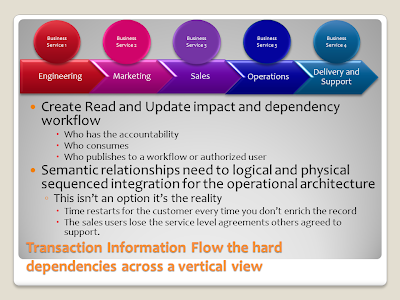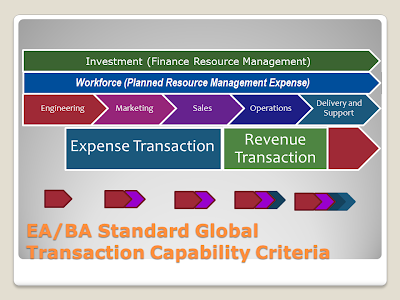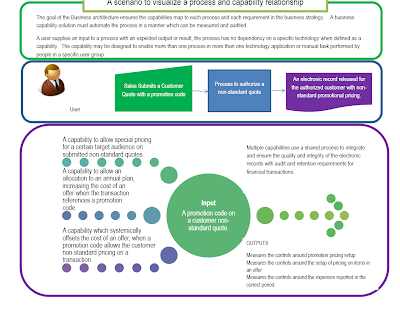Design Thinking
Discovery of the design patterns in a business model will surely allow us to uncover the trends or quantify our behaviors beyond what our stakeholders understand.Does the problem exist across each function within an organization?
Measure before and after the problem was reported.
Let me help in providing a golden rule which does nothing more than quickly allow us to aggregate the information by understanding the facts which are results of applied behaviors.
 |
| Entitlement by business process then global |
Systems (Cybernetics)
Understanding allows us to connect what are commonly disconnected parts of a whole. Sales as a function would be a pivot or leverage point between Engineering and Marketing. Assume each function would be a stakeholder to another function or the downstream consumer of the outputs from a function. |
| Operational Architecture both transaction life cycle usage |
Life Cycle
Your operational architecture serves as the host for all management and transaction capabilities. We have grouped by these two types of capabilities to keep it simple and to contain any confusion around updates and creates of a customer, supplier, employee, items in an offer or product, software and services in an offer and finally as employees for your organization or agency.A sales program will be based on specific criteria or segments from each of the three management capabilities.
A sales program will be identified in both North and South bound travelers.
A great example would be in the preceding photo.
A sales program intends to manage promotions, commission crediting and partner or distribution rewards.
Leverage Points
Integration between functions and technology would best be enabled using leverage points.A connection between two unrelated objects for the purpose of integrating across functional boundaries.
Party Management CapabilityThe business rules for a sales program are based on a party record from two of three in this family
- Employee Party
- Customer Party
Your party stakeholders are the drivers going north bound on the highway as your employees have a role of the auto car sales person, your customers will be the drivers on the highway
Financial Account Management Capability
The financial account codes are going to further segment your sales program, by geographical regions. The six segments in your sales journal would manage these relationships in the transaction system 4 of 6 financial codes will be leverage points.
- Country Code
- Location Code
- General Ledger Code
- Department Code
Offer Management Capability
An offer type based on the maturity of an offer enables one layer of segregation to drive your business model according to risk.- High - Emerging Offers
- Medium - Advanced Offers
- Low - Foundation/Core Offers
Technology Configuration
Out of the box solutions are designed into all software packages. There are two types of software in my understanding;- 3rd party functional software
- Custom developed software
- 3rd party
- Developed for a customer requirement and applicable only to a specific customer server.
- Customized by the customers' developers after purchase
- Developed in house by employees or agents of the organization
Management or Transactional Capabilities
Master Data - Create, Read, Update and Archive
Management Capabilities represent the master records for your party, offer and financial account structures.
The segmentation of the three core subjects must be natural or strong and no more than three nodes.
Legal liabilities may cause an external party to file damages against any organization who fails to protect all records associated with the external party.
Legal Evidence of Arrangement must on record and active before a company, organization or agency reports a profit (revenue) or loss (expense) on their quarterly reports to external stakeholders.
See the story behind executives who were jailed and fined for not managing their performance based on audit worthy records.
No backend updates to any record in these three categories;
- Party Master Records
- Offer Master Records
- Financial Account Master Records
System of Record - ERP
Grouping or making adjustments outside a system of record-assume your system of record is your ERP system. All three of the management capabilities are created, read and updated from ERP master records.
company financial accounting system (ERP), every EA and BA must understand the number of rows per workflow to accurately measure the threat outside the system of record.
may be done through daily batch runs. system in backend or shadow IT applications would threaten the company's brand and certainly threaten the freedom of your executives.
These records proving due diligence must be retained for up to 10 years. Records with zero data loss.
Sarbanes-Oxley Act in 2002-One example; Enron Executives
Annual Re-certification for ISO relies and reports on the effectiveness of these processes reporting them as major and minor non-conformance or best practices.
Why no more than three nodes?
The purpose of creating and updating a master record intends to allow the functional applications a trusted source for the functional applications.
- Complex hierarchies fail to support high performing acquisition of the single source of truth.
- Complex hierarchies fail to support Service Oriented Architecture delivery without transporting large data sets.
- Complex hierarchies fail to meet the strong and natural hierarchy rules.
Create, Read, Update and Archive
Transactional Capabilities represent the run time or operational event records created by users in their business process.
- A transaction user cannot be a management capability user.
- A management user cannot be a transaction capability user.
The ability to effectively design key controls around a "segregation of duties" MUST be met, monitored and records retained for both master record changes and adds and equally true for transaction records created.
- We have a group of users who can create and another will read.
- We have a group of users who create who also can update.
- We have two types of activities a user may elect, be authorized or have entitlement to a feature or sub-set of the features offered in any software delivered.
- Customized applications have not been designed to promote the rules according to standards for the functional purpose.
- Without a reference architecture control and corporate policy understanding across every line of business we are not going to have effective controls.
- Each iterative release, each small or minor update to the code, even the bi-monthly change control options in an Enterprise results in another control threat.
All exceptions are in the balance at no more than 20% of the time. Offer Management Capability-Setup items in an offer.
We can surely agree that a rule can be applied to any offer in any industry which classifies or groups an offer based on maturity.
Analogy - Highway
An offer being a vehicle during the manufacturing process the car must be built working with suppliers who fulfill your orders to allow your employees to build the vehicles.Your suppliers are going to travel South bound with your employees using the Expense Transaction Capability in your operational architecture.
How many business models are there really?


No comments:
Post a Comment